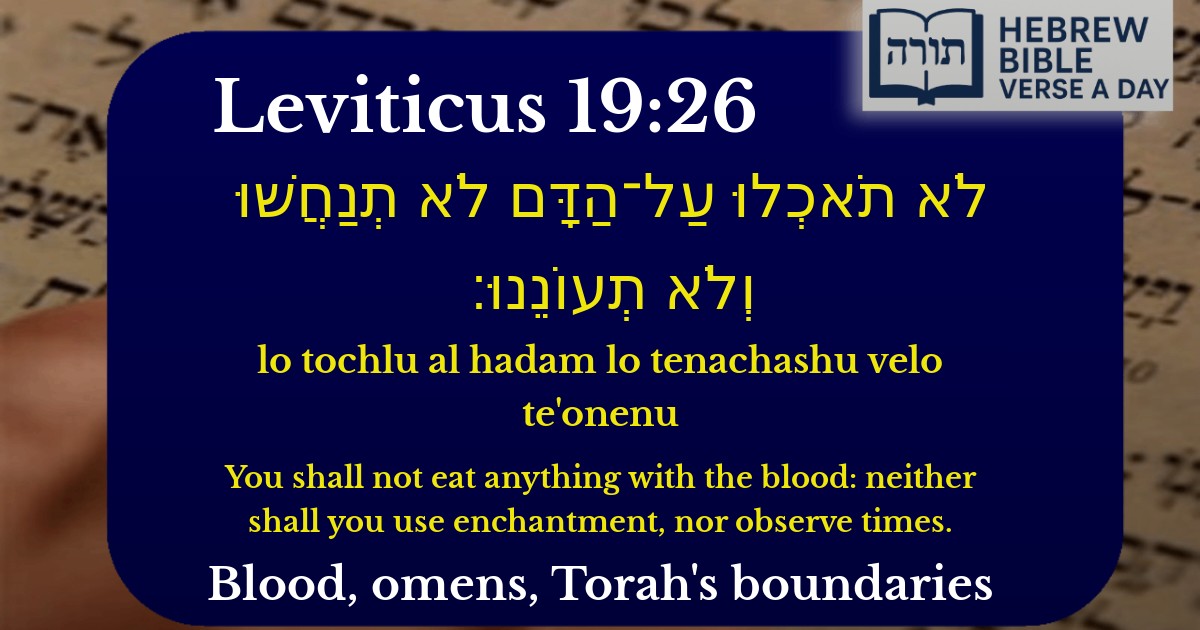Frequently Asked Questions
Q: What does 'You shall not eat anything with the blood' mean in Leviticus 19:26?
A: This commandment prohibits consuming meat that still contains blood, as blood represents the life force (nefesh) of an animal (see Leviticus 17:11). According to Jewish law (halacha), meat must be properly slaughtered (shechita) and then salted or broiled to remove all blood before consumption. Rashi explains that this verse also warns against eating a meal before praying for a condemned person's life (based on Sanhedrin 63a).
Q: Why does the Torah prohibit divination ('nor observe times') in Leviticus 19:26?
A: The Torah forbids divination and fortune-telling because these practices imply that events are controlled by forces other than Hashem. The Rambam (Hilchos Avodah Zarah 11:4) explains that these superstitious practices are meaningless and lead people away from trusting in G-d's providence. Judaism teaches that we should seek guidance through Torah study and prayer, not through occult methods.
Q: What is the connection between the three prohibitions in Leviticus 19:26?
A: The Sforno explains that all three prohibitions - eating blood, divination, and soothsaying - share a common theme of improperly seeking to manipulate or access life forces. Eating blood improperly accesses animal life force, while divination attempts to improperly access knowledge of the future. The verse comes to teach that our sustenance and knowledge must come through proper, permitted means according to Torah.
Q: How do we apply the prohibition against eating blood today?
A: Today, this prohibition is observed through the kosher laws of meat preparation: 1) Animals must be properly slaughtered (shechita) to drain most blood. 2) The meat must then be soaked, salted and rinsed to remove remaining blood (melicha), or broiled to achieve the same effect. 3) Eggs with blood spots must be discarded. The Shulchan Aruch (Yoreh De'ah 66-69) details these procedures that observant Jews follow today.
Q: What does Judaism say about astrology, based on 'nor observe times' in this verse?
A: While the simple meaning prohibits divination, the Talmud (Shabbat 156a) discusses whether astrology has any validity. While some sages acknowledged certain astrological influences, the consensus follows Rabbi Yochanan who said 'Ein mazal l'Yisrael' - Jews are not subject to astrological decree. The Rambam (Hilchos Avodah Zarah 11:8-9) strongly rejects astrology as foolishness, stating that our fate depends solely on our mitzvah observance and teshuvah (repentance).


Prohibition of Eating with Blood
The verse states: "לֹא תֹאכְלוּ עַל־הַדָּם" ("You shall not eat anything with the blood"). Rashi (Vayikra 19:26) explains that this prohibition refers to eating meat before the blood has been properly drained (through shechitah and kashering). The Rambam (Hilchot Ma'achalot Asurot 6:1) further clarifies that consuming blood is a severe transgression, as blood represents the life force (nefesh) of the animal, which belongs to Hashem.
Prohibition of Divination and Omens
The verse continues: "לֹא תְנַחֲשׁוּ" ("neither shall you use enchantment"). The Talmud (Sanhedrin 65b) defines nichush as superstitious practices, such as interpreting signs (e.g., a deer crossing one's path) as omens. The Rambam (Hilchot Avodat Kochavim 11:4) emphasizes that such behaviors undermine trust in Divine Providence and lead to idolatrous tendencies.
Prohibition of Astrology and Fortune-Telling
The verse concludes: "וְלֹא תְעוֹנֵנוּ" ("nor observe times"). Rashi explains this as avoiding the practice of determining "auspicious times" based on astrology. The Sifra (Kedoshim 6:6) teaches that relying on celestial signs contradicts the Torah's directive to place faith solely in Hashem. The Ramban (Vayikra 19:26) adds that these prohibitions guard against attributing power to forces other than the Almighty.
Underlying Principle